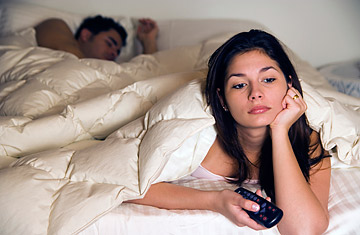
Staring at the clock's blinking red lights, tossing and turning until the sheets are tied in knots — some 40 million Americans are all too familiar with what a chronic sleep disorder feels like. In a quest to understand her own insomnia, journalist Patricia Morrisroe traveled from Las Vegas to north of the Arctic Circle and chronicled what she found in a new book, Wide Awake. Morrisroe talked to TIME about how sleep has evolved, how ancient Greeks went to sleep and why we need our z's.
So what happens to the body when it doesn't get enough sleep?
It depends on the amount of sleep you're getting. Researchers talk about impaired concentration and memory. Of the people who have gone on these long sleep-deprivation jags, one became a drifter and lost his wife and job. Another person [who set the Guinness World Record for sleep deprivation in 1965 with 264 hours, or more than 11 days awake] seemed to do quite well.
You say it's difficult to understand how sleep has evolved. What are some theories about why people sleep?
There's no "sleep bone" that people have been able to locate or find. So ultimately we don't know how people used to sleep. James McKenna, a doctor who specializes in infant sleep at Notre Dame, believes that early on, people probably slept in trees. How many hours did people sleep then? How many hours are we sleeping now? Is it far fewer hours? That type of thing is hard to track.
You point out that 40 million Americans have a chronic sleep disorder and another 30 million have intermittent sleep problems. How long have sleep disorders been on our radar?
Probably from the very beginning of time. There were [sleep-promoting] drugs like opium back from the Greeks. You had various theories about fatigue toxins that built up in the brain. The Frenchman Henri Pieron proposed that there was a chemical theory for sleep. Then when you had the whole epidemic of encephalitis lethargica, the sleeping sickness, [beginning in 1917,] that again focused people's interest on sleep. J.P. Morgan's wife drowsed for eight weeks and never woke up; he donated a tremendous amount of money to a neurological institute to study the disease.
So sleep has always been on people's minds. It's just that the whole field of sleep medicine was basically nowhere until the mid-1950s, and then you had the discovery of REM [Rapid Eye Movement] sleep. In the '50s, sleep was in the domain of psychiatry. The first sleep labs were really dream labs. And then in the '60s, they seized on the topic of insomnia. But insomnia has always been a vague complaint, so ultimately sleep medicine couldn't get its hands around it. With the discovery of narcolepsy, sleep at least had a disease to call its own. And yet it affects such a small percentage of people that it really wasn't able to give any prominence to the field. The invention of the CPAP machine [used for the treatment of sleep apnea] in 1981 really put sleep medicine on the map.
You mention "sleep-state misperception." Can you say more about people who think they are sleep deprived when they're actually not?
Some doctors have told me it's hard for them to understand whether their patients really do have insomnia. A lot of people tend to wake up during the night. Every 90 minutes or so you'll sort of wake up as you go into another cycle. Insomnia patients may remember that they're waking up a lot longer. Or somebody may just feel unrefreshed. I went to a medical-education course in Las Vegas where a woman was complaining she didn't sleep. A sleep study showed that she slept something like seven hours. But when she wrote down how she slept, she said, "I didn't sleep a wink." So I think for some people, they remember their awakenings so vividly, they just think they're awake a lot longer than they actually are.
Do you think technology and the demands it places on modern society have changed the way we sleep?
I went back and took a look at the newspaper accounts over the years of how people treated sleep. Increased industrialization had an impact on our sleep. So did the invention of the car, radio and television. There is no question that people were talking about the ill effects of modern life on sleep going back 100 years.
